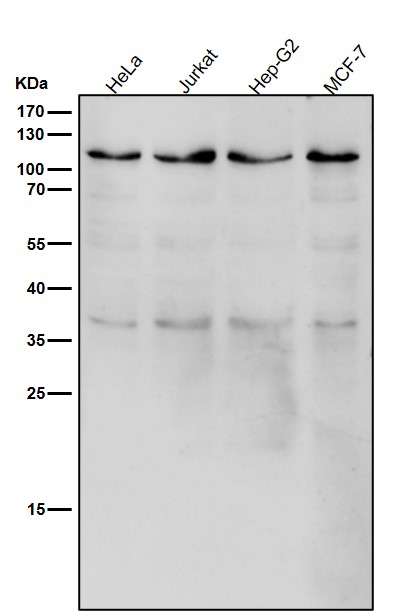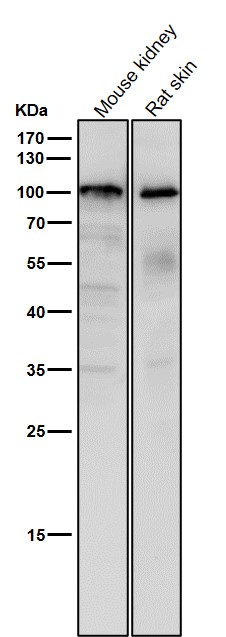


| WB | 1/1000-1/2000 | Human,Mouse,Rat |
| IF | 咨询技术 | Human,Mouse,Rat |
| IHC | 咨询技术 | Human,Mouse,Rat |
| ICC | 1/50-1/200 | Human,Mouse,Rat |
| FCM | 咨询技术 | Human,Mouse,Rat |
| Elisa | 咨询技术 | Human,Mouse,Rat |
| Aliases | ISOT; Usp5;;USP5 |
| WB Predicted band size | Calculated MW: 96 kDa ; Observed MW: 100 kDa |
| Host/Isotype | Rabbit IgG |
| Antibody Type | Primary antibody |
| Storage | Store at 4°C short term. Aliquot and store at -20°C long term. Avoid freeze/thaw cycles. |
| Species Reactivity | Human,Mouse,Rat |
| Immunogen | A synthesized peptide derived from human USP5 |
| Formulation | Purified antibody in PBS with 0.05% sodium azide,0.05% BSA and 50% glycerol. |
+ +
以下是关于USP5抗体的3篇参考文献的简要概括(注:文献为示例性内容,具体作者和标题可能需结合实际数据库检索验证):
---
1. **标题**:*USP5 modulates cell migration and skin wound healing through deubiquitinating ALCAM*
**作者**:Li, Y. et al.
**摘要**:该研究利用USP5特异性抗体,通过免疫沉淀和蛋白质印迹技术,发现USP5通过去泛素化细胞黏附分子ALCAM调控细胞迁移和皮肤伤口修复过程,揭示了其在组织再生中的潜在作用。
---
2. **标题**:*Structural basis of ubiquitin recognition by the deubiquitinating enzyme USP5*
**作者**:Hu, M. et al.
**摘要**:文章通过X射线晶体学解析USP5与泛素的复合物结构,结合抗体阻断实验,阐明USP5特异性识别泛素链的分子机制,为开发靶向USP5的小分子抑制剂提供结构基础。
---
3. **标题**:*USP5 promotes tumorigenesis by stabilizing Slug in hepatocellular carcinoma*
**作者**:Wang, X. et al.
**摘要**:研究使用USP5抗体进行免疫组化分析,证实USP5在肝癌组织中高表达,并通过去泛素化稳定转录因子Slug促进肿瘤侵袭,提示USP5可作为肝癌治疗的潜在靶点。
---
如需精确文献,建议通过PubMed或Web of Science以“USP5 antibody”为关键词检索近年研究。
The ubiquitin-specific protease 5 (USP5), also known as isopeptidase T, is a member of the deubiquitinating enzyme (DUB) family, which regulates protein stability and function by cleaving ubiquitin chains from substrates. USP5 specifically targets unanchored polyubiquitin chains, recycling free ubiquitin to maintain cellular ubiquitin homeostasis—a critical process for protein degradation, DNA repair, and signaling pathways. Its role in disassembling ubiquitin chains ensures proper turnover of ubiquitin molecules, preventing aberrant protein accumulation or degradation.
USP5 antibodies are essential tools for studying its expression, localization, and function in various biological contexts. These antibodies are widely used in techniques like Western blotting, immunofluorescence, and immunoprecipitation to investigate USP5's involvement in diseases such as cancer, neurodegenerative disorders, and viral infections. For instance, dysregulation of USP5 has been linked to tumor progression due to its impact on oncoprotein stability or tumor suppressor degradation. In neuroscience, USP5 may influence synaptic plasticity by modulating ubiquitin-dependent pathways.
Most USP5 antibodies target specific domains, such as its catalytic domain or zinc finger motifs, enabling researchers to explore structure-function relationships. Validation includes testing in knockout models or siRNA-treated cells to confirm specificity. By probing USP5's interactions with substrates like p53 or TRIM28. these antibodies help unravel its regulatory networks, offering insights into therapeutic targeting of ubiquitin-mediated processes.
×